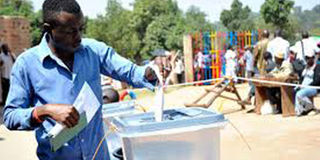Why we need electoral law reforms

What you need to know:
As it is, now becoming the norm, an election year in Uganda is usually characterised by brutality, violence, intimidation, torture, hate propaganda and fear-mongering. This makes an average Ugandan dread the fatigue of participating in elections
Uganda will hold a general election come February 2021. However, these elections require urgent law reforms. As it is, now becoming the norm, an election year in Uganda is usually characterised by brutality, violence, intimidation, torture, hate propaganda and fear-mongering. This makes an average Ugandan dread the fatigue of participating in elections.
The irony is that Ugandans know that an event of the election alone does not define democracy. Democracy is a function of liberalism that comes with a full set of requisite rights and freedoms; a free press, liberty, and freedoms of expression, association, worship and innovation and respect for human rights and rule of law. Most of these have been constrained under a tight leash by the regime. Without these rights and freedoms, the current democracy is rightfully a total mockery.
In addition, a democratic society must have functioning democratic institutions and a supporting culture of accountability, transparency, and consultation as its defining marks.
A dictatorship is not hard to identify. There is that one dominant leader who refuses to go away, controls the ruling party and the country’s assets. His government often controls, bans or tightly monitors opposing groups and their meetings. The disregard for individual citizens’ rights and the displacement of indigenous citizen’s rights for loyal foreigners prevails. The use of archaic, colonial and unjust laws, policies, torture and spies to control every aspect of people’s lives looms large over every mode of cultural expression - radio, cinema, newspapers, and television.
The potential showdown in a violent election makes many of Ugandans disinterested in the politics and leadership of Uganda.
Somehow, The US, UK, and EU are satisfied that Uganda is a democracy. This double standard has lowered the passing grade for Uganda so low such that it has eroded the value of human rights and fundamental freedoms as a quid pro quo for their interests in the region.
In the meantime, the Opposition are not having it easy. They have faced the full brutality of the militariSed police.
The consistent conduct of Uganda Police remove any pretense of impartiality as a legitimate authority over law and order. The police are overtly disruptive - serve to constrain and humiliate Opposition elements.
The story is the same as the so-called “Independent” Electoral Commission. Its ranks are filled with biased cadre officers of the ruling party.
These circumstances are dire and make elections in Uganda an embarrassment. Unfortunately, the “meal card” politics within the Opposition compels some to legitimise this tragicomedy by participating in it.
The most respectable thing to do is for Opposition to boycott any violent and irregular elections.
The first major step is for the Opposition to demand comprehensive reforms in the electoral laws.
These reforms should specify the role of the police, the army, and paramilitary groups during these elections. Most importantly, the EC should comprise representatives from all parties elected to Parliament.
Morris Komakech, [email protected]


